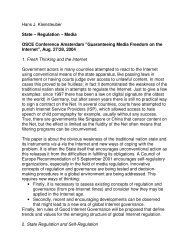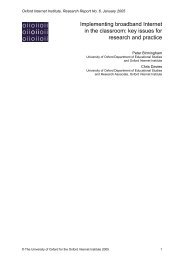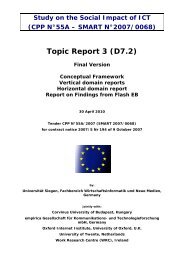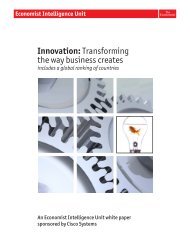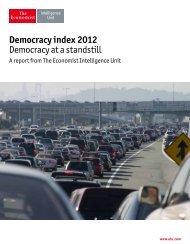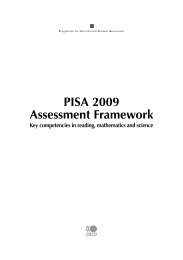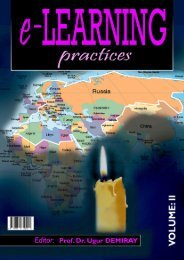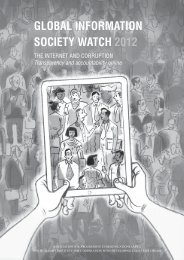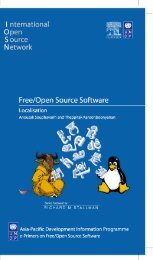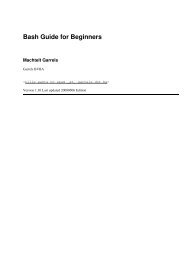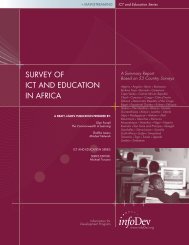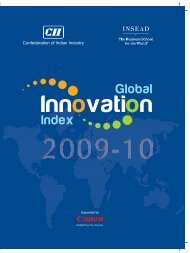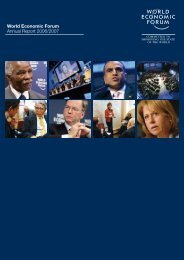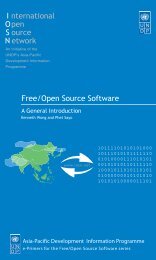Legal Aspects of the Information Society. - Free Technology Academy
Legal Aspects of the Information Society. - Free Technology Academy
Legal Aspects of the Information Society. - Free Technology Academy
You also want an ePaper? Increase the reach of your titles
YUMPU automatically turns print PDFs into web optimized ePapers that Google loves.
GNUFDL • 7 Introduction to <strong>the</strong> legal aspects <strong>of</strong> <strong>the</strong> information society<br />
1. The free s<strong>of</strong>tware movement and <strong>the</strong> law<br />
Facing <strong>the</strong> restrictive legal framework where <strong>the</strong> default rule is "all rights reserved",<br />
and <strong>the</strong> tendency to apply this and corner scientific and technological<br />
knowledge by <strong>the</strong> large computer companies – perhaps led by large corporations<br />
as Micros<strong>of</strong>t, Oracle, Apple and Adobe, <strong>the</strong> free s<strong>of</strong>tware movement (free<br />
and open, we are not distinguishing at this point) was born. This movement<br />
seeks to maintain and protect freedom in this sector, which is fundamental<br />
to modern society. This movement argues that <strong>the</strong> "non-free" trend is threatening<br />
to make us into <strong>the</strong> society <strong>of</strong> permissions – <strong>of</strong> "permissions, please"<br />
– where <strong>the</strong> owners <strong>of</strong> <strong>the</strong> knowledge must be asked for permission to use<br />
a work, which is granted under ever more restrictive, sometimes draconian,<br />
conditions.<br />
<strong>Free</strong> s<strong>of</strong>tware<br />
<strong>Free</strong> s<strong>of</strong>tware is a matter <strong>of</strong> <strong>the</strong> users' freedom to run, copy, distribute, study, change and<br />
improve <strong>the</strong> s<strong>of</strong>tware. More precisely, it means that <strong>the</strong> program's users have <strong>the</strong> four<br />
essential freedoms:<br />
• The freedom to run <strong>the</strong> program, for any purpose (freedom 0).<br />
• The freedom to study how <strong>the</strong> program works, and change it to make it do what you<br />
wish (freedom 1). Access to <strong>the</strong> source code is a precondition for this.<br />
• The freedom to redistribute copies so you can help your neighbour (freedom 2).<br />
• The freedom to distribute copies <strong>of</strong> your modified versions to o<strong>the</strong>rs (freedom 3). By<br />
doing this you can give <strong>the</strong> whole community a chance to benefit from your changes.<br />
Access to <strong>the</strong> source code is a precondition for this.<br />
The <strong>Free</strong> S<strong>of</strong>tware Definition can be found at <strong>the</strong> GNU Operating System site.<br />
However, what distinguishes <strong>the</strong> s<strong>of</strong>tware sector from o<strong>the</strong>r parts <strong>of</strong> this more<br />
general protest movement is that <strong>the</strong> free s<strong>of</strong>tware movement is based strictly<br />
and directly, to mark its protest, on current laws. <strong>Free</strong> s<strong>of</strong>tware is distinguished<br />
from non-free s<strong>of</strong>tware by how those same laws are used. <strong>Free</strong> s<strong>of</strong>tware is not<br />
distinguished from non-free s<strong>of</strong>tware by its quality or technology, although<br />
it is argued that it presents advantages in <strong>the</strong>se terms, but by <strong>the</strong> copyright<br />
licensing regime. A free s<strong>of</strong>tware licence does not contain <strong>the</strong> protection and<br />
control measures traditionally included in non-free s<strong>of</strong>tware licences.<br />
We should note that now, as <strong>of</strong> 2007 and 2008, several "traditional" s<strong>of</strong>tware<br />
companies, which had used a "non-free" or "exclusive" model for <strong>the</strong> distribution<br />
<strong>of</strong> <strong>the</strong>ir products, are now embracing <strong>the</strong> free movement (or at least,<br />
<strong>the</strong> open source movement). Micros<strong>of</strong>t has published several programs under<br />
free licences, using its own licences, two <strong>of</strong> which have been approved "Open<br />
Source" by <strong>the</strong> Open Source Initiative. Sun (now part <strong>of</strong> Oracle) has released<br />
<strong>the</strong> Java environment under <strong>the</strong> GPL licence (and has purchased MySQL). Ya-



